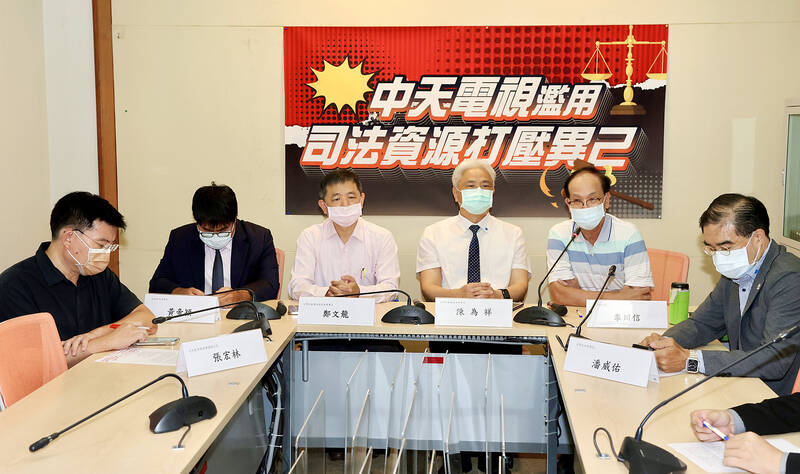Legal experts yesterday urged CTiTV to drop lawsuits against tycoon Robert Tsao (曹興誠), who called it a “bandit network,” saying that the phrase had legitimacy in the context.
CTiTV chairman Liao Li-sheng (廖麗生) on Monday filed two lawsuits against Tsao, the founder of United Microelectronics Corp, seeking NT$500 million (US$16.17 million) in a civil lawsuit and pressing a separate criminal defamation suit.
However, Taiwan Jury Association director Chen Wei-shyang (陳為祥) told a news conference at the legislature in Taipei that Tsao has freedom of speech rights, while courts have ruled that CTiTV has received financial support from the Chinese government.

Photo: CNA
The association believes the TV network should drop the lawsuits, Chen said.
“Taiwan has media freedom, with journalists free to cover the news because we have a democratic society with the rule of law and good freedom of speech protections,” he said. “CTiTV enjoys media freedom and free speech, but it is trying to restrict media freedom and free speech with the lawsuits.”
The litigation is an “abuse of democracy to subvert democracy, and an abuse of freedom to suppress freedom,” said Taiwan Forever Society chairman Huang Di-ying (黃帝穎), an attorney, adding that CTiTV is owned by Want Want China Times Media Group.
The description of CTiTV as a “bandit network” (“feitai, 匪台”) is a reference to “communist bandits” (“gongfei, 共匪”), a phrase that has been used in Taiwanese politics, Huang said.
Although it is a bit caustic coming from Tsao, the phrase has a legitimate basis and has been used in media reports, he said.
Moreover, “the London-based Financial Times newspaper reported that China’s Taiwan Affairs Office directly influences news articles published by firms controlled by Want Want China Times, prompting group chairman Tsai Eng-meng (蔡衍明) to file a lawsuit, which was later withdrawn,” Huang said.
Hon Hai Precision Industry founder Terry Gou (郭台銘) during a public event in June 2019 had an angry exchange with a CTiTV journalist, Huang said.
Gou asked the journalist: “When will the Taiwan Affairs Office stop giving instructions to your boss?” adding that Tsai “is a henchman for the office, always pandering to it,” Huang said.
“Gou accused media firms under Want Want China Times of working on behalf of the office, but no lawsuits were filed, so the courts are likely to rule that calling CTiTV a bandit network is based on factual information,” Huang said.
The term “bandit” has legitimacy, as it is in some armed forces regulations, he said.
The armed forces’ post office regulations stipulate that “military mail must not enter enemy territory, including communist bandit-controlled areas,” he said.
Citizen Congress Watch director Chang Hung-lin (張宏林) said that CTiTV was trying to intimidate Taiwanese by showing that it would sue anyone who calls it a “bandit network.”
Courts ruled in favor of former Democratic Progressive Party legislator Luo Wen-chia (羅文嘉) in two separate cases, the second in November last year, after Tsai filed a defamation lawsuit over a media interview in 2019.
Luo told reporters that “CTiTV received financial support from the Chinese government, so it can be considered ‘red’ media,” Chang said.
Moreover, an investigation into the Luo cases, which included an examination of Want Want China Times’ own accounting records, showed that it received NT$15.2 billion from the Chinese government in just over a decade before 2018, as well as payments of more than US$5 million for advertising and more than 1 million yuan (US$143,298) for rent to operate in Taiwan.
The judges ruled that there was no defamation by Luo, Chang said, adding that “Tsao’s ‘bandit network’ comment is protected by his freedom of speech.”
“He has his opinion, which can be a subject of public discussion,” Chang said of Tsao. “CTiTV should drop the lawsuits, as its action infringes personal freedom, is a waste of judicial resources and is meant to suppress media freedom in Taiwan.”
CTiTV said in a statement that its lawsuits were justified.
“Independence groups want to find a judicial back door,” it said. “They use opposition to China as an excuse to maliciously slander others.”
“This should not be permitted in a democratic, rule-of-law country like the Republic of China [ROC],” it said. “Pan-green groups are acting in a low manner in the name of resisting China and protecting the ROC.”

A fugitive in a suspected cosmetic surgery fraud case today returned to Taiwan from Canada, after being wanted for six years. Internet celebrity Su Chen-tuan (蘇陳端), known as Lady Nai Nai (貴婦奈奈), and her former boyfriend, plastic surgeon Paul Huang (黃博健), allegedly defrauded clients and friends of about NT$1 billion (US$30.66 million). Su was put on a wanted list in 2019 when she lived in Toronto, Canada, after failing to respond to subpoenas and arrest warrants from the Taipei District Prosecutors’ Office. Su arrived at Taiwan Taoyuan International Airport at 5am today on an EVA Air flight accompanied by a

An essay competition jointly organized by a local writing society and a publisher affiliated with the Chinese Communist Party (CCP) might have contravened the Act Governing Relations Between the People of the Taiwan Area and the Mainland Area (臺灣地區與大陸地區人民關係條例), the Mainland Affairs Council (MAC) said on Thursday. “In this case, the partner organization is clearly an agency under the CCP’s Fujian Provincial Committee,” MAC Deputy Minister and spokesperson Liang Wen-chieh (梁文傑) said at a news briefing in Taipei. “It also involves bringing Taiwanese students to China with all-expenses-paid arrangements to attend award ceremonies and camps,” Liang said. Those two “characteristics” are typically sufficient

A magnitude 5.9 earthquake that struck about 33km off the coast of Hualien City was the "main shock" in a series of quakes in the area, with aftershocks expected over the next three days, the Central Weather Administration (CWA) said yesterday. Prior to the magnitude 5.9 quake shaking most of Taiwan at 6:53pm yesterday, six other earthquakes stronger than a magnitude of 4, starting with a magnitude 5.5 quake at 6:09pm, occurred in the area. CWA Seismological Center Director Wu Chien-fu (吳健富) confirmed that the quakes were all part of the same series and that the magnitude 5.5 temblor was

Restarting the No. 2 reactor at the Ma-anshan Nuclear Power Plant would take up to 18 months, Minister of Economic Affairs J.W. Kuo (郭智輝) said today. Kuo was answering questions during a meeting of the Legislative Yuan’s Economics Committee, where legislators are considering amendments to the Renewable Energy Development Act (再生能源發展條) amid concerns about the consequences of the Pingtung County reactor’s decommissioning scheduled for May 17. Its decommissioning is to mark the end of Taiwan’s nuclear power production. However, Chinese Nationalist Party (KMT) lawmakers have proposed an amendment to the Nuclear Reactor Facilities Regulation Act (核子反應器設施管制法) that would extend the life of existing